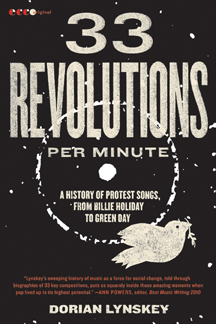Popdose has joined the Kirkus Book Bloggers Network, taking to the virtual pages of Kirkus Reviews Online to dish on the best — and sometimes the worst — in pop-culture and celebrity books.
This week we salute global protesters while wondering: Where did all the good protest songs go?
 The Occupy movement rolls on in cities around the world — one suspects that only winter cold will succeed in dispersing the protestors, where tear gas and rubber bullets have failed — and though the Occupiers have made a lot of noise, there’s been very little music to emerge out of the movement. This has proved alarming to journalists of a certain age, who’ve been moved — just as they at the start of the Iraq war — to write Very Concerned pieces on “the death of the protest song.” Now, a lot of this is just Boomer thumbsucking about the Kids These Days, and how we were so much cooler when we were young (not that we’re really old now, God forbid). But when Rufus Wainwright, one of our finest young songwriters, shows up at Occupy Wall Street only to regale the crowd with an ironic Madonna cover — well, maybe those Boomer journalists are on to something.
The Occupy movement rolls on in cities around the world — one suspects that only winter cold will succeed in dispersing the protestors, where tear gas and rubber bullets have failed — and though the Occupiers have made a lot of noise, there’s been very little music to emerge out of the movement. This has proved alarming to journalists of a certain age, who’ve been moved — just as they at the start of the Iraq war — to write Very Concerned pieces on “the death of the protest song.” Now, a lot of this is just Boomer thumbsucking about the Kids These Days, and how we were so much cooler when we were young (not that we’re really old now, God forbid). But when Rufus Wainwright, one of our finest young songwriters, shows up at Occupy Wall Street only to regale the crowd with an ironic Madonna cover — well, maybe those Boomer journalists are on to something.
It was in this frame of mind that I belatedly dug into Dorian Lynskey’s 33 Revolutions Per Minute: A History of Protest Songs from Billie Holiday to Green Day, which came out in paperback earlier this year — a dense, rollicking people’s history of 20th century politics and pop, refracted through the prism of thirty-three songs.
At least, that’s what it purports to be. Lynskey is far sneakier than that, though, and what could have been a collection of loosely-related essays becomes instead a grand and hurtling narrative. The 33 songs that lend the book its structure seem chosen arbitrarily, and sometimes scarcely figure in the text. A chapter ostensibly about Rage Against the Machine turns out to be mostly devoted to Radiohead; Phil Ochs doesn’t rate a chapter of his own, but haunts the book’s entire first half, his idealism, overreaching, and eventual dissolution serving as an elegy for the midcentury’s promises of change.
Lynskey’s grasp of political theory is sure, and he deftly summarizes historical moments without patronizing his audience. And he ably captures the quease-making paradoxes that arise at the intersection of politics and pop: the blustering idealism that makes U2 both so beloved and so reviled; John Lennon talking revolution from within an impenetrable bubble of wealth and privilege; white audiences ponying up good money at a Nina Simone show for the privilege of being made to feel hated.
Read the rest of this article at Kirkus Reviews!





Comments